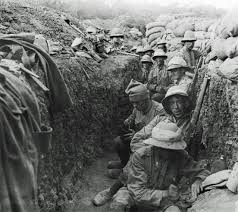trench
英 [trentʃ]
美 [trentʃ]
- n. 沟,沟渠;战壕;堑壕
- vt. 掘沟
- vi. 挖战壕;侵害
- n. (Trench)人名;(英、西)特伦奇
使用频率:

中文词源
trench 沟,渠,战壕
来自古法语 trenchier,去砍,劈,刨,挖,来自拉丁语 truncare,砍,切掉,词源同 truncate,tranche. 后引申词义沟,渠,特指战壕。
英语词源
- trench
-
trench: [14] A trench is etymologically something ‘cut’ or ‘sliced’. The word was borrowed from Old French trenche ‘slice, cutting, ditch’, a derivative of trenchier ‘cut’ (from which English gets trenchant [14]). And this in turn went back to Latin truncāre ‘cut, mutilate’ (source of English truncate [15]), a derivative of truncus ‘tree-trunk, torso’ (source of English trunk) – the semantic link being the ‘cutting’ of branches from a tree or of limbs from a body.
The sense ‘ditch’ for trench comes of course from the notion of ‘cutting’ a long narrow hole in the ground (a similar inspiration underlies cutting ‘excavation for a railway, road, etc’). Trencher ‘platter’ [14] came from the Anglo-Norman derivative trenchour, and originally denoted both a board for ‘cutting’ food up on and a ‘slice’ of bread used as a plate.
=> trenchant, trencher, truncate, trunk - trench (n.)
- late 14c., "track cut through a wood," later "long, narrow ditch" (late 15c.), from Old French trenche "a slice, cut, gash, slash; defensive ditch" (13c., Modern French tranche), from trenchier "to cut, carve, slice," possibly from Vulgar Latin *trincare, from Latin truncare "to cut or lop off" (see truncate). Trenches for military protection are first so called c. 1500. Trench warfare first attested 1918. Trench-coat first recorded 1916, a type of coat worn by British officers in the trenches during World War I.
权威例句
- 1. They recaptured their trench.
- 他们重新夺回了堑壕.
- 2. Trench a fire by pulling down houses
- 拆倒房屋来隔绝火势的蔓延
- 3. Almost with fascination , Hearn watched Croft working on his trench knife.
- 侯恩冷眼瞧着克洛夫特磨刀,一时简直瞧得出了神.
- 4. The soldiers raked the trench with machine - gun fire.
- 战士们用机关枪向战壕内扫射.
- 5. The soldiers recaptured their trench.
- 兵士夺回了战壕.